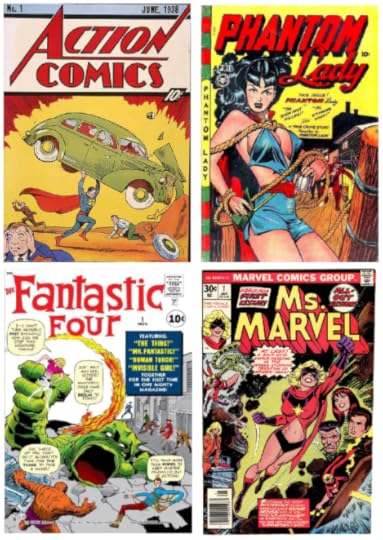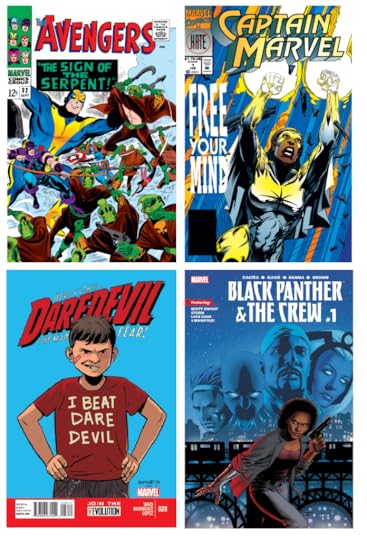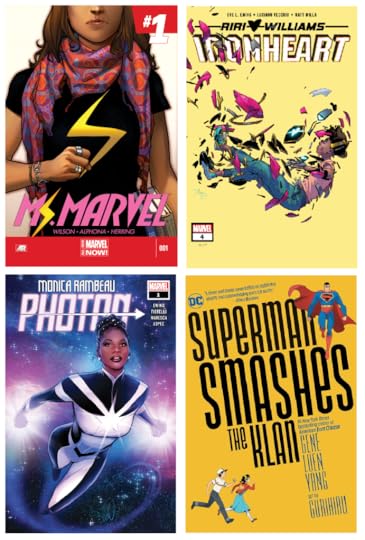Superhero Comics: My Mostly-New, Mostly-Different Syllabus!
I’ve been teaching a version of “Superheroes” for my first-year writing seminar for about a decade now. My last major reboot was in 2020 (Black Superheroes Matter), with an inevitable annual refresh. I’ve really enjoyed pairing comics with authors’ non-comics writing (G. Williow Wilson’s The Butterfly Mosque, Ta-Nehisi Coates’ Between the World and Me, Eve Ewing’s Electric Arches, Nnedi Okorafor’s Binti), but I’m feeling the need for a new approach.
Though I personally prefer physical copies of texts, my students have a strong preference for digital. Instead of fighting that, I’m leaning into it — and the unexpected freedom it brings. Previously, I’ve only taught works that have been anthologized in trade paperbacks. With digital archives I can curate my own idiosyncratic collections however I want. So I’ve come up with three units.
The First Four Decades:
Superman, 1938Phantom Lady, 1948Fantastic Four, 1961Ms. Marvel, 1977Marvel Comics & the KKK:
Sons of the Serpent, 1966-1975Sons of the Serpent, 1991-1997Sons of the Serpent, 2013Black Panther & the Crew, 2017The Last Decade (or Two)
Ms. Marvel, 2014Ironheart, 2018Photon, 2022Superman Smashes the Klan, 2020I’ve taught early Superman many many times (as well as 1939 Batman and a range of Wonder Woman), and after experimenting with Spider-Man and Marvel Firsts: 1960s, I’ve found that early Fantastic Four remains equally effective for revealing not just the historical genre but its social contexts. I swear it’s only a happy coincidence that both had blockbuster movie reboots this summer.

More interestingly, I’ve added two new works to the expanded early period. I’ve published on Matt Baker’s Phantom Lady layouts (and blogged about them too), but never taught them — mainly because there’s no good paperback collection, and I find the online archives too clunky to navigate. So one of my self-assigned sabbatical tasks was to download and copy-and-paste my own pdf collection (which is also legal, since it’s all public domain — just like Superman will be in nine years).

As much as I love Baker, I’m especially happy to highlight Ruth Roche, who not only scripted the whole run but was Jerry Iger’s business partner after Will Eisner left the Eisner-Iger Studio, which then became the Roche-Iger Studio. For contrast, I also include one episode from the original 1943 series (so well before Matt Baker) and one from 1955 (after Matt Baker and the creation of the Comics Code).
I’m looking forward to my students comparing Roche’s 1948 Phantom Lady plots to the gender norms of Lois Lane in 1938 and then Sue Storm in 1961. Which then sets up Ms. Marvel in 1977.
I plan to use but not require Comixology (knowing my students know many many more ways to access digital content), warning them that Marvel series and volume numbering is extremely confusing. I selected most of the first year, with some odd and partial leaps to grab later key moments (like when Claremont finishes unifying Carol Danvers/Ms. Marvel into one personality — and also a quick glimpse of the Dave Cockrum costume design, which will prove useful later in the semester).

The second unit is where things get stranger. I’ve thought about but never seriously considered teaching an entire course on supervillians, but one unit seems reasonable. And what villains are more villainous than the Ku Klux Klan? I will be shocked if any of my students have ever heard of the Sons of the Serpent — Marvel’s version of the KKK introduced in 1966 and used sporadically since. I’ve blogged about them for a few years, and my forthcoming The Color of Paper: Representing Race in the Comics Medium (due out from Ohio State University Press in February 2026) was originally going to include a way too long chapter on them. I cut it and now hope to spin it into its own book at some point. Meanwhile, I’m curious what my students will make of the material and how different creative teams use white supremacist villains for different political purposes over a half-century range. I end with Ta-Nehisi Coates’s Black Panther & the Crew: We Are the Street (which doesn’t include the Sons of the Serpent, but does include the KKK). I’ve taught it before (with mixed results), and I think it will make much more sense in this context.
Also on a more general note, white supremacist supervillains feel like the right focus at this particular moment in what I hope will continue to be U.S. history.

The third unit brings us up to (almost) the present. Just as I can’t not teach the 1938 Superman, the 2014 Ms. Marvel feels equally indispensable. I’m also curious how the two Ms. Marvel series will speak to each other across a four-decade gap. After a surprising amount of dithering, I decided to double down on Eve Ewing, teaching not only her Ironheart (again) but also her more recent Photon (which calls back to Dwayne McDuffie’s 1994 Captain Marvel one-off in the KKK unit). And then a double final call-back with Gene Luen Yang’s Superman Smashes the Klan. During an earlier mid-semester lull, I’ll play sections from the 1946 Adventures of Superman radio episodes that Yang adapts — plus my own baby TEDx talk on the influence of the 1914-era Klan on the superhero genre.
I also have one day’s homework devoted to secondary readings. I’ve changed these so many times, usually pairing one with each night’s comics selection, but I went with slightly longer comics readings this time (usually something like eight issues rather than six). The focus is analyzing comics art, which Anna Peppard (again) summarizes well. I used to include Scott McCloud’s chapter “Body Language,” but this time I’m trying John Buscema (and not just because he appears two other times on the syllabus). I find that Witek’s cartoon vs. naturalistic modes is an indispensable tool. Witek also hits layout well, supplemented by (what I call) panel accents. And two pieces on coloring: an interview excerpt from Stan Golberg, Marvel’s main colorist of the early 1960s, and my all-time favorite comics essay by Ron Wimberly (showing, among other things, the technological leap from four-plate to digital coloring). Plus the Bechdel test, which has come up so many useful times, but I’ve never provided its source before.
Students will have to incorporate some of these tools in their three essays. I know AI has grown exponentially since I started sabbatical last fall, but I’m still tentatively optimistic that my evidence-first essay process will keep my students actually writing (I blogged about that two years ago in Superhero Comics vs. ChatGPT).
That’s the plan. If you’re interested in super-specifics, here’s the full schedule. We meet Tuesday and Thursday from 1:00 to 2:30.
DAY 1
Thursday, September 4
Unit 1: The First Four Decades

DAY 2
Tuesday, September 9
Superman 1938:
Action Comics #1-12 (1938-9), Jerry Siegel (scripts) & Joe Shuster (art)
DAY 3
Thursday, September 11
Phantom Lady 1947:
Police Comics #15 (January 1943), Quality Comics, “The School for Spies,” uncredited: likely includes Ruth Roche (scripts) & Joe Kubert (art)
Phantom Lady (1947-9), Fox Comics, credited pseudonym “Gregory Page”: likely includes Ruth Roche (scripts) & Matt Baker (various art):
Phantom Lady #14 (October 1947), “Condemned Venus”
Phantom Lady #14 (October 1947), “Shroud for the Bride“
Phantom Lady #16 (February 1948), “Monster in the Pool”
Phantom Lady #17 (April 1948), “Soda Mint Killer”
Phantom Lady #17 (April 1948), “The Stinging Whip”
Phantom Lady #18 (June 1948), “Ghosts, Galleons, and Gold”
Phantom Lady #18 (June 1948), “The Fat Connoisseur”
Phantom Lady #19 (August 1948), “Wine, Women, and Sudden Death”
Phantom Lady #20 (October 1948), “Bullets for Ballots”
Phantom Lady #20 (October 1948), “Ace of Spades”
Phantom Lady #1 (1955), Farrell Comics, “The Ringside Racket,” uncredited: likely includes Ruth Roche (scripts)
Assortment of advertisements from Fox Comics issues
DAY 4
Tuesday, September 16
Fantastic Four 1961:
Fantastic Four (1961-2): #1-8, Stan Lee (words) & Jack Kirby (pencils)
DAY 5
Thursday, September 18
Ms. Marvel 1977:
Captain Marvel #18 (1969), Roy Thomas (script) & John Buscema (pencils)
From Ms. Marvel Epic Collection: This Woman, This Warrior (collecting Ms. Marvel 1977-79 series) Book 1:
Ms. Marvel #1-2, Gerry Conway (script) & John Buscema (pencils)
Ms. Marvel #3, Chris Claremont (script) & John Buscema (pencils)
Ms. Marvel #5-7, Chris Claremont (script) & Jim Mooney (pencils)
Ms. Marvel #11, Chris Claremont (script) & Sal Buscema (pencils)
First seven pages of Ms. Marvel #13, Chris Claremont (script) & Jim Mooney (pencils)
Cover of Ms. Marvel #20, Dave Cockrum (cover art, costume design)
DAY 6
Tuesday, September 23
Secondary readings:
Anna Peppard, “I am once again begging academics to remember that comics have pictures”
Stan Lee and John Buscema, How to Draw Comics the Marvel Way (excerpts)
Joseph Witek, pp. 27-34 of “Comics Modes: Caricature and Illustration in the Crumb Family’s Dirty Laundry,” Critical Approaches to Comics [LEYBURN ONLINE]
Joseph Witek, pp. 152-155 of “The Arrow and the Grid”
Chris Gavaler and Leigh Ann Beavers, “Panel Accents”
Stan Goldberg, pp. 16-17 of “The Goldberg Variations,” Alter Ego #18
Ron Wimberly, “Lighten Up,” The Nib
The Bechdel Test, https://wordsmith.org/words/bechdel_test.html?fbclid=IwAR2DuqD9SysWPjJJGlcHaG2-xsDsdiMLaeCic8q0dLgL8YMGh0wR6qdK19ULinks to an external site.
DAY 7
Thursday, September 25
Essay 1 complete 4-page draft due for class workshop
DAY 8
Tuesday, September 30
No Class: individual conferences
DAY 9
Thursday, October 2
Essay 1 Final draft due at start of class
In class:
TEDx, “Are Superhero White Supremacists?”
excerpts from The Adventures of Superman, “The Clan of the Fiery Cross,” June 1946
Unit 2: Marvel Comics & the KKK

DAY 10
Tuesday, October 7
Sons of the Serpent, 1966-1974:
Avengers #32-33 (September-October 1966) [1963-1996 series, vol. 1], Stan Lee (words) & Tom Heck (pencils)
Avengers #73-74 (February-March 1970) [1963-1996 series, vol. 1], Roy Thomas (scripts) & Frank Giacoia and John Buscema (pencils)
Defenders #22-25 (April-June 1975) [1972-1986 series, vol. 1], Steve Gerber (scripts) & Sal Buscema (pencils)
October 9
Fall Reading Day (No Class)
DAY 11
Tuesday, October 14
Sons of the Serpent, 1991-1997:
Avengers #341-2 (November-December 1991) [1963-1996 series, vol. 1], Fabian Nicieza (scripts) & Steve Epting (pencils)
Captain Marvel #1 (February 1994), Dwayne McDuffie and Dwight Coye (scripts) &
Mark Bright (pencils)
Captain America #8-11 (June-September 1997) [1996-1997 series, vol. 2], James Robinson (scripts) & Joe Bennett (pencils)
DAY 12
Thursday, October 16
Sons of the Serpent, 2013:
Daredevil #28-29, 31-36 (2013) [2011-2014 series], Mark Waid (scripts) & Javier Rodriguez (art)
DAY 13
Tuesday, October 21
Black Panther & the Crew 2017:
Black Panther & the Crew: We Are the Street (2017), Ta-Nehisi Coates (scripts) &
Butch Guice (pencils)
DAY 14
Thursday, October 23
Essay 2 complete 4-page draft due for class workshop.
DAY 15
Tuesday, October 28
No Class: individual conferences
DAY 16
Thursday, October 30
Essay 2 Final draft due at start of class
Unit 3: The Last Decade (or Two)

DAY 17
Tuesday, November 4
Ms. Marvel 2014:
Ms. Marvel: No Normal #1-5, #8-11 (2014) [vol. 3, 2014 series], G. Willow Wilson (scripts) & Adrian Alphona (pencils)
Or cut #8-11 and replace with: Generations: Ms. Marvel & Ms. Marvel #1 (2017), G. Willow Wilson (scripts) & Paolo Villanelli (pencils)?
DAY 18
Thursday, November 6
Ironheart 2018:
Ironheart #1-5, #7-9 (2018), Eve L. Ewing (scripts) & Kevin Libranda (pencils)
DAY 19
Tuesday, November 11
Photon 2022:
Ironheart #10-12
Monica Rambeau: Photon #1-5 (2022-2023), Eve L. Ewing (scripts) & Luca Maresca (pencils)
DAY 20
Thursday, November 13
Superman Smashes the Klan, 2020:
Superman Smashes the Klan (2020), Gene Luen Yang (scripts) & Gurihiru (art)
DAY 21
Tuesday, November 18
?
DAY 22
Thursday, November 20
Essay 3 complete 4-page draft due for class workshop
Thanksgiving Break
DAY 23
Tuesday, December 2
No Class: individual conferences
DAY 24
Thursday, November 4
Essay 3 Final draft due at start of class
Final Exam

Chris Gavaler's Blog
- Chris Gavaler's profile
- 3 followers



